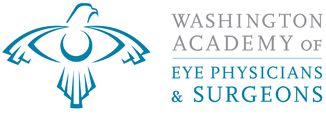|
The Washington Academy of Eye Physicians and Surgeons and the American Academy of Ophthalmology share eye health tips and advice to keep you safe during the COVID-19 pandemic
Kirkland, WA – 4/10/20 – As information about the new coronavirus comes at a furious pace, at times offering conflicting and confusing advice, the Washington Academy of Eye Physicians and Surgeons and the American Academy of Ophthalmology want to share what we know right now about protecting your vision and your health during the COVID-19 pandemic.
- Avoid touching your eyes By now you’ve heard about the importance of hand washing, coughing into your elbow, and keeping your hands away from your face and eyes. The last one is easier said than done, right? Here’s a suggestion, switch from contact lenses to glasses for the time being. Substituting glasses for lenses can decrease irritation and make you pause before touching your eye. If you continue wearing contact lenses, follow these hygiene tips to limit your chances of infection.
- Pink eye is a COVID-19 symptom, but it’s rare About 1 to 2 percent of reported coronavirus cases show symptoms of conjunctivitis, better known as pink eye. If you or a family member gets pink eye, don’t panic, especially if you’re not experiencing the more common coronavirus-related symptoms, such as a dry cough, shortness of breath and fever. Viral conjunctivitis is very common, plus it’s allergy season. Try these home treatments for pink eye. If symptoms continue, consult with your doctor to determine if you need an in-person office visit.
- The malaria drugs used to treat coronavirus will not blind you Patients who rely on hydroxychloroquine to treat autoimmune conditions such as lupus rarely experience eye damage. Only about 1 to 2 percent of patients develop retinal problems during a 5-year course of treatment. Even though patients with COVID-19 receive double the dosage, they are treated for a fraction of the time, only one to two weeks. However, if you are older than 50 and have a history of retinal disease, macular degeneration or have been exposed to the breast cancer therapy tamoxifen, discuss these drugs with your doctor. We also want to emphasize that there currently is no definitive scientific evidence these drugs are effective in treating the virus.
- Have an upcoming routine eye care appointment? Call your ophthalmologist first Most ophthalmologists are performing emergency care only right now to keep patients safe and to conserve much-needed medical supplies. If you receive regular treatments to maintain your vision, such as injections for macular degeneration, talk to your ophthalmologist. They can tell you if you need to come in for treatment.
- Make sure you have refills of critical medications If you take medicated eyedrops or other medical prescriptions, that you cannot or should not go without, make sure you have enough to get by if quarantined or if supplies become limited. Your ophthalmologist or pharmacist may be able to help obtain approval through insurance.
- Consider home remedies for nonurgent relief Some eye conditions can be treated from home, such as red eye, dry eye or eye strain. Try these at-home remedies. If symptoms persist, call your ophthalmologist. Many are conducting appointments through telehealth.
“During this chaotic pandemic, it can be overwhelming to keep up with the news and advice coming from a variety of sources,” said Sonal Tuli, MD, clinical spokesperson for the American Academy of Ophthalmology. “The most reliable information is that which is based on science, so maintain good hygiene, continue to practice social distancing, and follow the advice of your ophthalmologist to protect your good vision.”
K. David Epley, MD, adds "if you are concerned about your eyes or those of your children, it's best to call. Although ophthalmologists are only seeing urgent and emergent problems in the office, we can often help you figure out what to do over the phone or via a telehealth visit. These visits involve some home testing and a face-to-face communication with your doctor, and they are covered by your insurance.
To keep up with the latest information for maintaining your eye health during the pandemic, visit: https://www.aao.org/eye-health/coronavirus.
About the American Academy of Ophthalmology The Academy is the world’s largest association of eye physicians and surgeons. A global community of 32,000 medical doctors, it protects sight and empowers lives by setting the standards for ophthalmic education and advocating for its patients and the public. The Academy innovates to advance the profession and to ensure the delivery of the highest-quality eye care. Through its EyeSmart® articles on AAO.org, the Academy provides the public with the most trusted information about eye health. For more information, visit aao.org.
|
